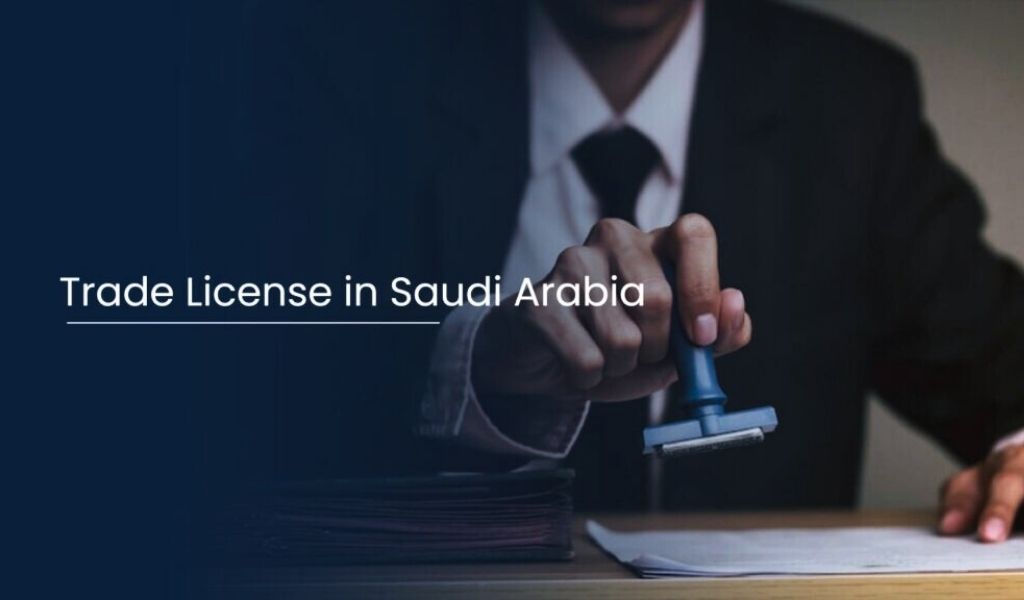
Trade License In Saudi Arabia – A Complete 2025 Application Guide
Trade License is a mandatory document that allows businesses to operate legally within the Kingdom.The foundation of any legal business activity in the Kingdom of Saudi Arabia is obtaining the appropriate authorization. Getting a Saudi Arabian trade license is the first step, regardless of whether you’re starting a trading business in Riyadh or a service center in Jeddah.
This guide breaks down every step of the trade license Saudi application process so you can confidently navigate requirements, prevent expensive delays, and launch your business without hiccups.
Understanding The Importance Of A Trade License In Saudi Arabia

A license to trade The legal document that gives you permission to carry out particular business operations inside the Kingdom is a trade license Saudi, sometimes referred to as a Commercial Registration or CR. Absent this license –
- A corporate bank account cannot be opened.
- You are not allowed to own or rent business space.
- You are unable to sponsor work visas or hire staff.
Since the Saudi trade license essentially serves as the entryway to all other business steps, it is crucial that you comprehend the entire procedure.
Types of Trade Licenses and Choosing the Right One

The Ministry of Commerce in Saudi Arabia divides trade licenses into a number of categories, each of which is connected to your line of work –
Type of License and Common Activities Covered
- Commercial License Trading (import/export, wholesale, retail)
- Industrial License Manufacturing, assembly, industrial services
- Professional / Service License Consultancy, legal, engineering, health, and education services
- Agricultural License Farming, livestock, aquaculture
Determine which license category best fits your business model before you start. A business license in Saudi Arabia will fall under the Commercial License category for the majority of import-export and retail endeavors.
Eligibility Criteria and Key Requirements for 2025

Although the fundamental needs are the same from year to year, 2025 will see improved digital procedures and minor regulatory changes. What you’ll need is as follows –
1. Ownership Structure Domestic or International – Any licensed entity may be fully owned by Saudi nationals. In some industries, foreign investors might need a local partner, even though many operations now permit 100% foreign ownership.
2. The bare minimum of capital – Although professional and industrial licenses frequently set thresholds (such as SAR 500,000 for specialized consulting firms), commercial entities typically do not have a set minimum capital.
3. Office Space – Evidence of an ownership deed or commercial lease. The address must correspond to the authorized activities (e.g., office for services, warehouse for trading goods).
4. Local Service Agent or Designated Manager – You must designate a Local Service Agent to communicate with government agencies if your business is entirely foreign-owned (at a small fee).
5. No Objection Certificate (NOC) – If the manager or owner works somewhere else in the Kingdom, they must have a No Objection Certificate (NOC).
Step‑by‑Step 2025 Application Process

Step 1 – Reserve Your Trade Name
- Open the online portal of the Ministry of Commerce (MCI) and log in.
- Send in three suggested trade names in Arabic and English.
- Get your name reservation approved in a matter of minutes.
Advice – Make sure your name
- Accurately describes your main line of work.
- Doesn’t violate already-existing trademarks.
- Complies with naming guidelines (no religious allusions, for example).
Step 2 – Select Your Business Activity Codes
To identify your licensed operations, use the standardized Nomenclature of Economic Activities (ISIC) codes. Future license amendments are avoided with accurate activity selection.
Step 3 – Prepare Required Documents
Compile and submit the following via the MCI portal –
- Copies of a resident’s passport and Iqama, or a foreign national’s passport and visa page.
- A copy of the title deed or lease agreement.
- Memorandum of Association (for branches) or Articles of Association (for companies).
- Current employer’s NOC (if applicable).
Step 4 – Pay the Fees
Application fees vary by license type and duration (one‑ to five‑year terms). Typical costs in 2025 range from SAR 1,000 to SAR 3,000 for a standard commercial license, plus SAR 500–1,500 for municipality approvals.
Step 5 – Zoning approval and municipal license (Baladiya)
The local municipality will do the following within ten working days –
- Check your property for zoning compliance and safety.
- Give out the Baladiya (premises license).
- Before your CR is finalized, you must complete this step.
Step 6 – Finalize Commercial Registration (CR)
Following the issuance of the Municipality license –
- Your Saudi trade license certificate is electronically issued by the Ministry of Commerce.
- You get your own CR number, which serves as your company’s identification in all dealings with the government.
Post‑License Obligations

Make sure you stay in compliance once you have your company license Saudi Arabia –
1. Annual Renewal – To avoid penalties (SAR 100 per month of lateness), renew your CR before it expires.
2. Chamber of Commerce Membership – Membership in the Chamber of Commerce is required within 30 days of the issuance of the CR.
3. Zakat and Tax Registration – If your yearly revenue surpasses SAR 375 000 (for VAT), you must register with the General Authority of Zakat and Tax (GAZT).
4. GOSI Enrollment – Enroll Saudi and foreign workers in the General Organization for Social Insurance (GOSI).
Common Pitfalls and How to Avoid Them

| Challenge | Solution |
| Incomplete Document Uploads | Use a pre‑submission checklist and double‑check all scans. |
| Premises Non‑Compliance | Engage a local facility consultant to pre‑inspect zoning rules. |
| Delay in Municipality Approval | Liaise through your Local Service Agent for faster follow‑ups. |
| Naming Conflicts | Research existing trademarks on the Saudi IP portal before naming. |
Leveraging Professional Support – Express Business Service

Even the most conscientious applicant may encounter difficulties due to local nuances and sporadic policy changes, even though the trade license Saudi application process is primarily digital. Express Business Service can help with that –
1. Completely Advice – They handle every aspect, from obtaining Baladiya approvals to reserving trade names.
2. Regulatory Monitoring – Avoid surprises by staying ahead of 2025 updates.
3. Document Preparation – Make sure the first submission is complete and formatted perfectly.
4. Government Liaison – They expedite approvals thanks to their established connections with MCI, the Municipality, and GAZT.
When you work with Express Business Service, you can concentrate on your main strategy while professionals take care of the license logistics.
Estimated Timeline and Cost Breakdown

| Process Stage | Duration | Estimated Cost (SAR) |
| Trade Name Reservation | < 1 day | 200 |
| Document Preparation & Upload | 1–3 days | — |
| Fee Payment & Government Review | 1–2 days | 1,200 |
| Municipality Inspection & License | 7–10 days | 1,000 |
| Final CR Issuance | 1 day | — |
| Total | ~2 weeks | 2,400 |
The prices listed below are estimates for a basic commercial license in 2025; actual costs may vary depending on location, activity, and length of license.
Conclusion
Getting your trade license Saudi Arabia is a game-changing move that gives your business legitimacy and opens up growth opportunities in one of the most vibrant markets in the world. You can reduce obstacles and create a clear route from name reservation to final CR issuance by using this 2025 application guide. Enlist Express Business Service, the partner that transforms Saudi licensing complexity into streamlined success, for specialized support, effective processing, and peace of mind.
Start your journey now by obtaining your Saudi trade license, obtaining your Saudi Arabian company license, and expanding your company into new markets within the Kingdom.
Also Read: How To Open Company In Saudi Arabia With 100% Foreign Ownership



